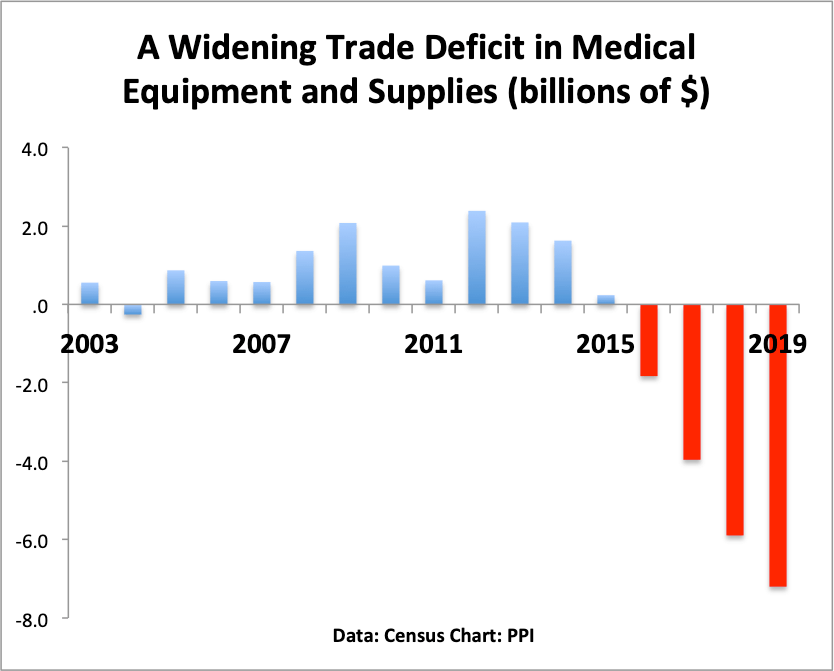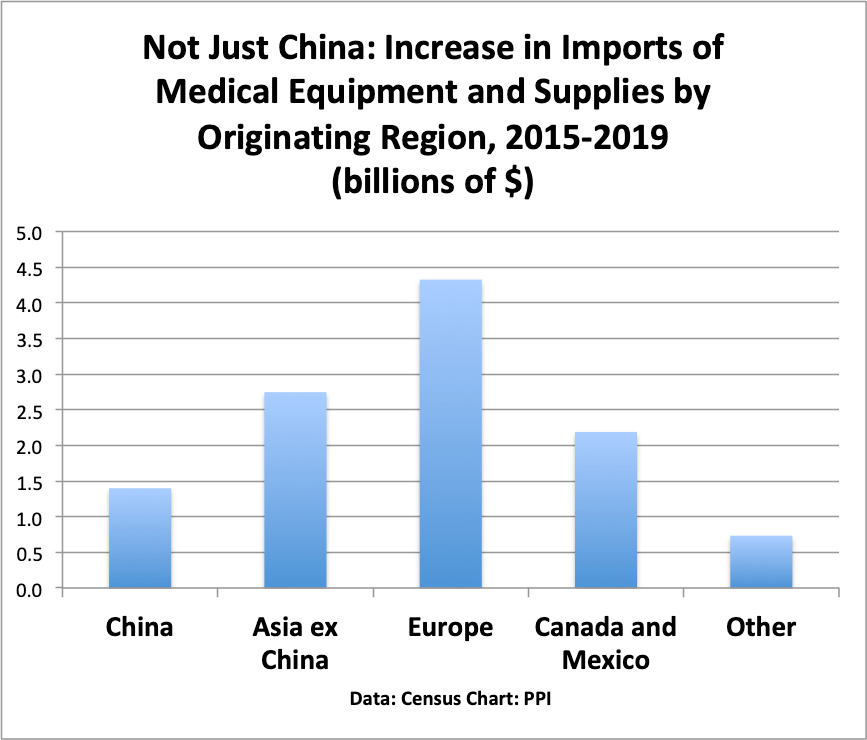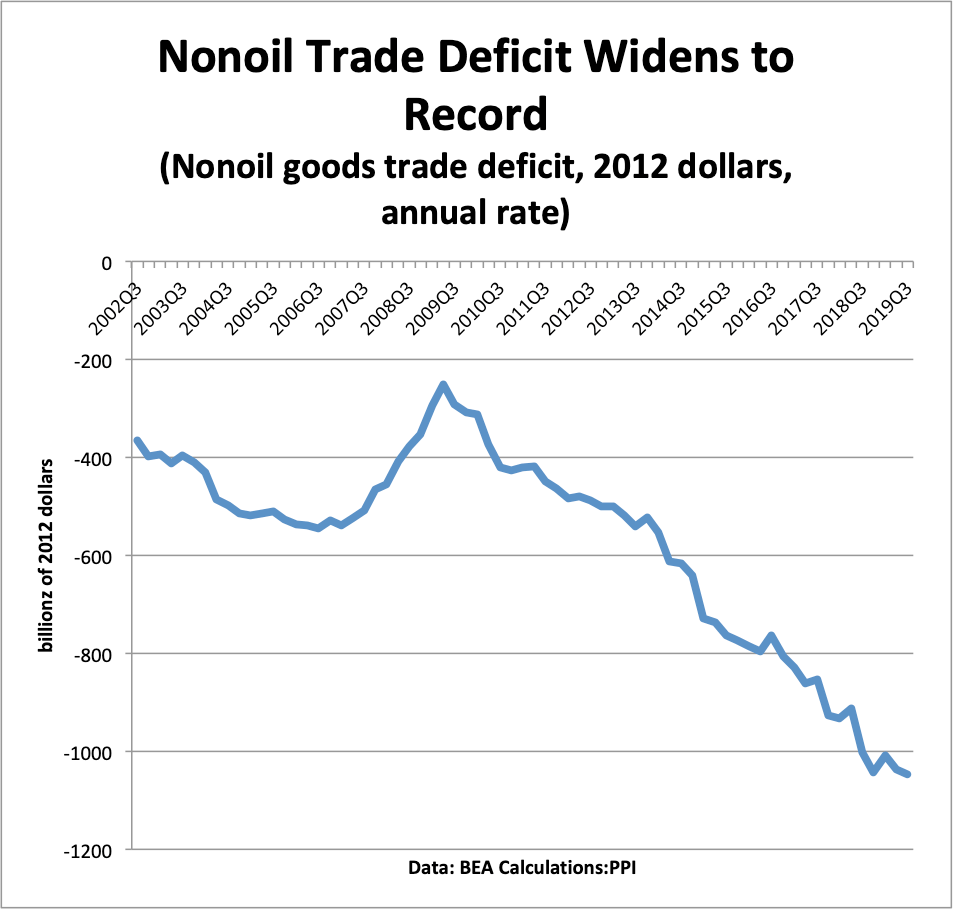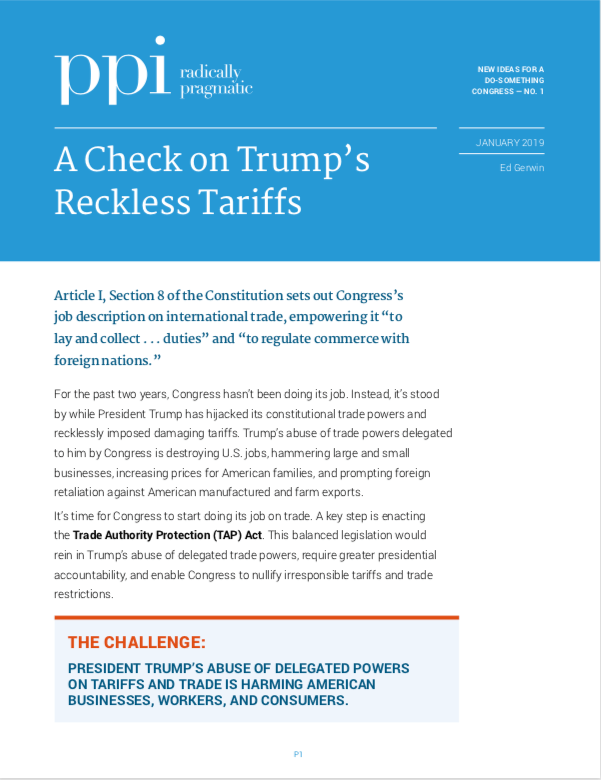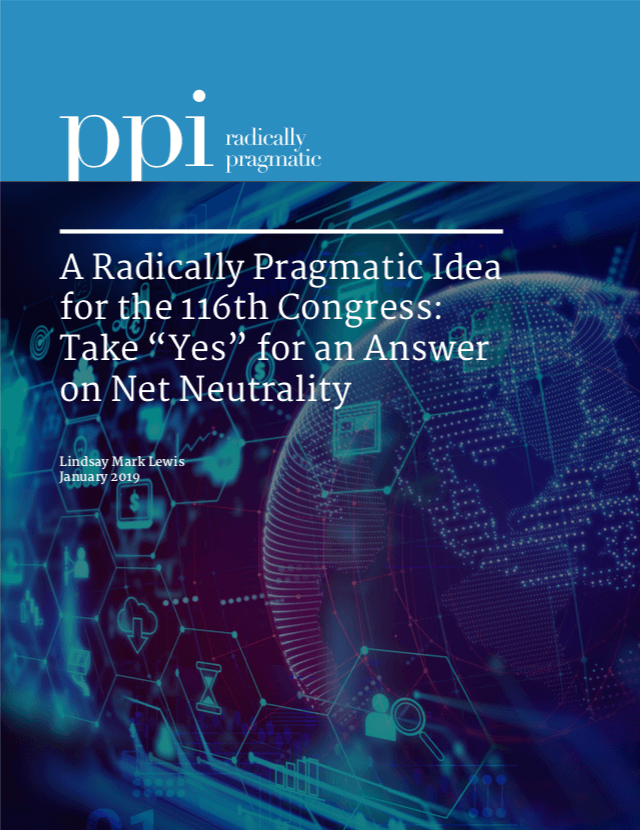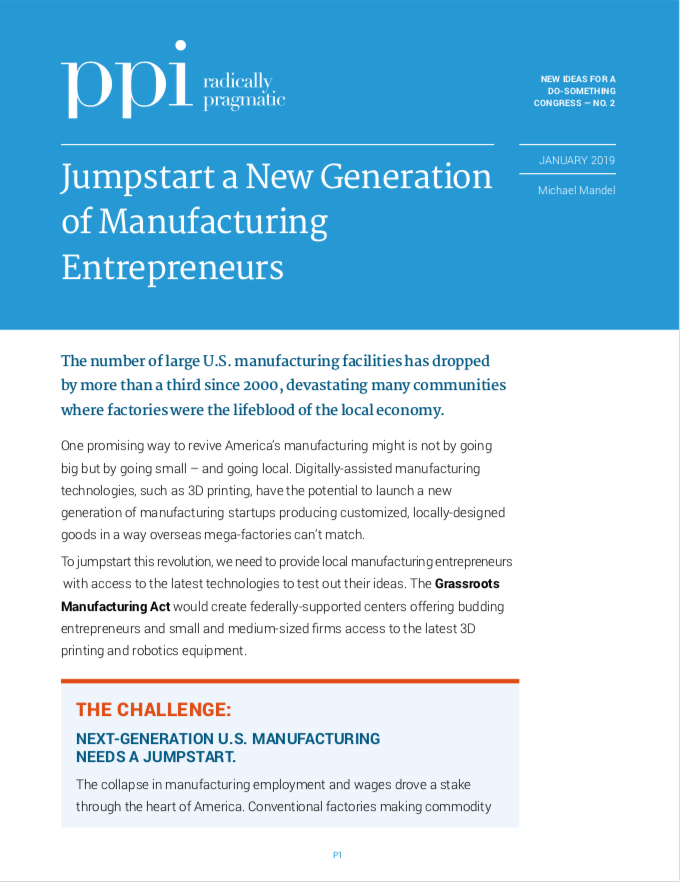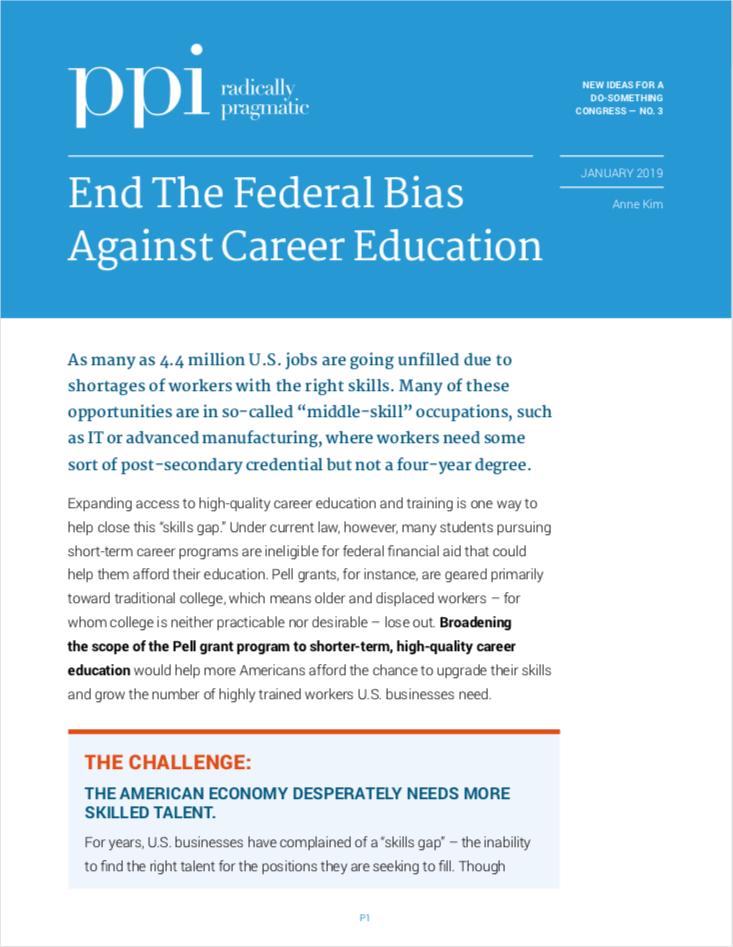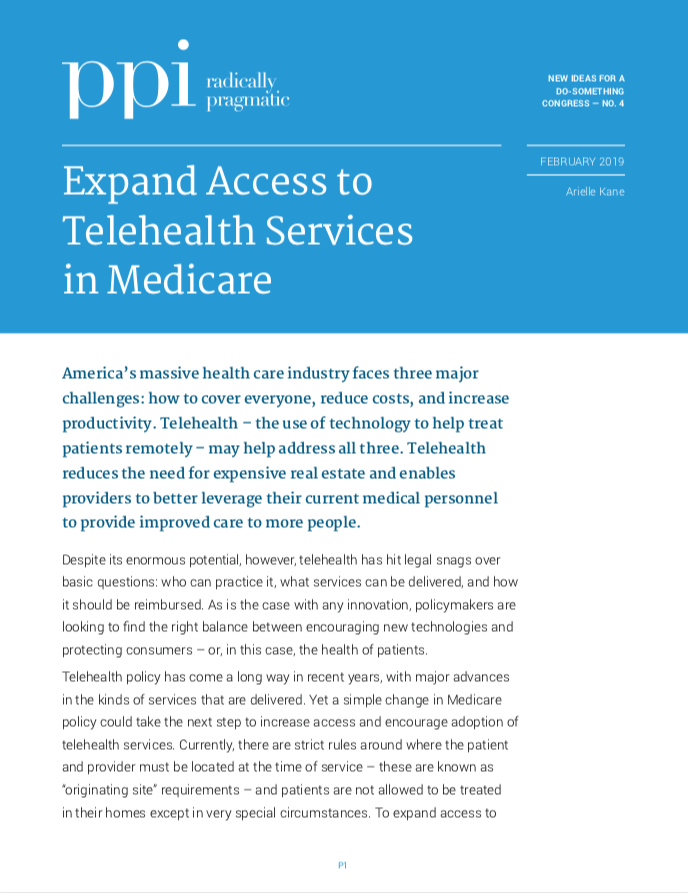CAN A NEW DEMOCRATIC ADMINISTRATION RECONSTRUCT DIGITAL TRADE POLICY WITH EUROPE FROM THE ASHES OF TTIP?
As the global leader in digital trade, the United States has a big stake in ensuring that international rules facilitating its continued expansion are put in place.
The Obama Administration’s bold agenda to establish these rules across Europe and the Asia-Pacific did not yield lasting success, with the failure of the Transatlantic Trade and Investment Partnership (TTIP) negotiations and the Trump Administration’s withdrawal from the Trans-Pacific Partnership (TPP). Nonetheless, the key elements of US digital trade policy enjoy bipartisan policy support, providing a promising basis for the next Democratic administration to re-engage with Europe, our biggest digital trading partner.
Part 1 of this issue brief explains why international rules are needed to protect and facilitate digital trade. Part 2 describes the turbulent past decade in transatlantic trade relations and the growing importance of US digital trade with Europe. Part 3 explains why the US government and the European Union (EU), during TTIP negotiations, were unable to agree on a digital trade chapter, including a key provision guaranteeing the free flow of data. Finally, Part 4 suggests how two parallel sets of trade negotiations beginning early this year — between the EU and the United Kingdom (UK) and between the United States and the UK — may help a future US Administration end the transatlantic stand-off over digital trade.
1. THE CASE FOR DIGITAL TRADE AGREEMENTS
The United States leads the world in the fast-growing digital economy.1 Digital services include not just information and communications technology (ICT) but also other services which can be delivered remotely over ICT networks (e.g. engineering, software, design and finance).2 Although trade in digital services is hard to measure precisely, there is no mistaking that it has become one of the fastest-growing areas for the United States internationally. In 2017, all types of digital services made up 55% of all U.S. services exports, and yielded 68% of the U.S. global surplus in services trade.3 The beneficiaries of this burgeoning area of trade are not just the U.S. technology giants, but also many smaller and medium-sized companies that develop and sell digital services or use ICT networks for marketing products to consumers.
More than a decade ago, the Office of the US Trade Representative (USTR) recognized the US comparative advantage in digital services trade and began to pursue binding rules with a number of foreign governments. TPP negotiations were the first major step in this direction. The TPP agreement signed by the Obama Administration included provisions designed to protect against practices harmful to digital trade. It prohibited:
- Customs duties and other discriminatory measures on digital products like e-books, movies, software and games;
- Requirements that data or computing facilities be localized in the foreign jurisdiction;
- Discriminatory treatment of crossborder data flows;
- Obligations to use local technology, content, or suppliers;
- Discriminatory foreign standards or burdensome testing requirements; and
- Requirements for disclosing source code and algorithms.
TPP also included facilitative measures:
- Requiring governments to adopt measures to protect against on-line fraud and guard consumers’ personal information;
- Promoting cooperative approaches to cybersecurity; and
- Facilitating the use of electronic authorizations and signatures for e-commerce, electronic payments, and other on-line applications
President Trump’s decision to withdraw the United States from TPP left US digital services companies exposed to these harmful practices in the Asia-Pacific region. From the perspective of liberalizing and expanding US digital trade, it was a spectacular own goal.4 However, USTR quickly set out to partially mitigate its effect by seeking bilateral trade accords with some TPP signatories. Digital chapters in the updated Korea-US Free Trade Agreement (KORUS), the new US-Mexico-Canada Free Trade Agreement (USMCA), and, most recently, the Japan-US Digital Trade Agreement largely duplicate the TPP’s digital trade provisions.
2. THE TRANSATLANTIC TERRIBLE TEENS
Transatlantic trade politics also has seen its share of drama over the past decade. The comprehensive TTIP negotiations begun in 2013 badly backfired. Popular fears of US corporate domination flared across Europe, the EU’s member states failed to back the project enthusiastically, and progress between US and European Commission negotiators on the many subject-matter chapters proved glacial. As the Obama Administration came to an end, TTIP talks were quietly shelved.
The Trump Administration’s trade agenda for Europe has been strikingly different. It has concentrated on rectifying the sizeable US deficit in merchandise trade with the EU, which reached an estimated record high of $168 billion in 2018.5 The President demanded that the EU, which is solely responsible for the bloc’s international trade relations, address the imbalance in such areas as steel, aluminum and automobile trade. (He also somewhat mystified Germany by insisting that it negotiate directly with the United States to reduce the U.S. goods trade deficit.) The US Government determined that a number of jurisdictions including the EU had engaged in trade practices unfair to US steel and aluminum, and imposed higher tariffs on these imported products as a consequence; higher tariffs on European autos so far remain a threat.
In the summer of 2018, European Commission (then-)President Jean-Claude Juncker managed partly to defuse transatlantic tensions by agreeing to negotiate with the United States on increasing EU purchases of US-made industrial goods and on related regulatory standard.
Juncker also committed to greater European purchases of US natural gas and soybeans. Trump in return agreed not to proceed with unilateral tariff increases for the time being. Since the advent of new EU leadership late last year, USTR Robert Lighthizer and his Commission counterpart Philip Hogan have stepped up efforts toward reaching, before the 2020 US presidential election, a limited accord in the areas identified by Trump and Juncker.
Throughout the decade, the volume of goods and services trade across the Atlantic has continued to grow steadily. The United States and the European Union are still each other’s largest trading partners. US goods exports to the EU grew to $293 billion in the first eleven months of 2018, a 13% increase over the previous year.6 US exports of all types of services to the EU reached a record $298 billion in 2017, resulting in a $66 billion surplus in 2017.7 European countries comprise four of the top ten export markets for US services, and in 2017 the Union as a whole absorbed 37% of US services exports.8
Despite the continuing growth in trade, the next Democratic administration will inherit a transatlantic trade policy environment characterized by an unusually high level of tension and distrust. TTIP’s failure appears to have stifled any impulses in Washington and Brussels simply to resume the slog towards a comprehensive trade agreement. Still, there are good reasons for Democrats to not abandon the work begun on digital trade during the TTIP negotiations.
3. THE US DIGITAL TRADE IMPASSE WITH EUROPE
Since Trump’s trade ambitions with the EU remain firmly focused on the goods deficit, the question of whether the United States should resume direct digital services trade negotiating efforts with Europe seems likely to be deferred till the next administration. From an economic perspective, the case for US re-engagement is compelling. In 2017, the United States exported $204.2 billion in digital services to Europe, generating a surplus in this area of more than $80 billion.9 International data flows, measured in terms of capacity for data bandwidth, also are heavily skewed in a transatlantic direction. Cross-border data transfers between the United States and Europe, by this measure, are 50% higher than those between the United States and Asia.10 In sum, the transatlantic area is the world’s largest for digital trade.
During TTIP negotiations, the United States proposed language close to TPP digital trade provisions, but the EU objected to a number of them. One of the most important was a US proposal to guarantee cross-border ‘free flow’ of electronic information for business purposes, and to put bounds on the extent to which European public policy measures relating to personal privacy could serve as an exception to unrestricted data flows.
The United States proposed that public policy exceptions be allowed, but that they be subjected to long-established World Trade Organization (WTO) disciplines. These WTO rules allow for exceptions for legitimate public policy objectives, so long as they do not constitute arbitrary or unjustifiable discrimination or disguised restrictions on trade, and they are narrowly tailored to achieve a public policy objective.11 Alleged breaches could ultimately be addressed through a formal dispute settlement system, if necessary.
The EU regarded the US proposal as an attack upon its unfettered discretion to apply its privacy laws to data moving across the Atlantic, and it rejected the possibility of any discipline based upon WTO rules. The EU’s rejection of objective limits on its potential public policy measures leaves it free to invoke privacy rules as a basis to discriminate against US digital service providers or to protect local competitors. The issue remained firmly deadlocked when TTIP negotiations were set aside.12 Since then, the United States and the EU have not re-engaged bilaterally on digital trade rules.
Both governments are among the eighty countries participating in a low-profile multilateral negotiation on electronic commerce (e-commerce) launched a year ago under WTO auspices, however.13 In Geneva, the United States has tabled a similar proposal to its TTIP and TPP language; the EU so far has not managed to offer a counter-proposal. For the time being, it seems unlikely that the WTO negotiations will yield quick success in settling the disagreement between the EU and the United States and other like-minded countries on regulatory limits to the free flow of data.14
A new Democratic Administration should engage bilaterally with the EU to see if there might be scope for a targeted digital trade agreement, but without softening its insistence on a rigorous free flow of data obligation. Agreeing with the EU on the proper scope for public policy exceptions should not be an impossible task, as WTO rules provide a useful framework. Moreover, it is conceivable that the new leadership of the European Commission at some point will consider jettisoning its insistence on a selfjudging privacy exception, in favor of language more consistent with international trade law.
4. BREXIT AND DIGITAL TRADE
Following Britain’s January 31 departure from the European Union, it now has embarked on the urgent task of negotiating its future economic relationship with the EU. Brexit notwithstanding, the EU will remain the UK’s principal trading partner; 45% of overall UK exports in 2018 were destined for the Continent.15 At the end of 2020, however, if no accord is reached, EU tariffs and quotas on UK exports would revert to much higher WTO tariff levels, which would have a damaging effect on UK-EU trade.
In addition to fixing tariff levels, Britain and the UK also must agree on the extent to which the UK will continue to adhere to EU regulations in a host of areas – for example, workers’ and consumers’ right, the environment, and antitrust. Many observers expect the UK-EU talks on these non-tariff barriers to be difficult and drawn out, likely stretching beyond the 2020 deadline. Despite continuing tough UK rhetoric, the parties may well settle for a ‘phase one’ agreement on goods tariffs, and grant themselves an extension into 2021 or beyond to complete the rest of a comprehensive agreement.
Setting the terms for digital trade with the EU will be particularly important for Britain. UK services exports to the EU yielded a £77 billion surplus in 2018, more than offsetting a deficit in goods trade.16 Approximately three-quarters of Britain’s data flows are with EU countries17, making harmonization with the Continent on privacy regulation crucial for its thriving data-dependent businesses, such as financial services.
In its negotiating mandate for the future economic partnership agreement with the UK, the EU specifically calls for provisions facilitating digital trade, but also indicates an intention to “address data flows subject to exceptions for legitimate public policy objectives, while not affecting the Union’s personal data protection rules.”18 The UK’s counterpart negotiating mandate similarly calls for measures to facilitate the flow of data to and from the EU, and expresses an ambition to go beyond the digital trade provisions in the EU’s trade agreements with other countries.19
The Union previously had pledged to decide before the end of 2020 whether the UK’s postBrexit privacy protections are ‘adequate’ in relation to those on the continent; an adequacy determination would be by far the most favorable and efficient legal basis for data flows across the Channel.20 The EU should have leverage in this separate negotiation, and as a result the UK’s future data protection regime should remain generally close to the EU’s General Data Protection Regulation (GDPR). An adequacy finding is not a foregone conclusion, however, as Britain may be reluctant to alter its wide-ranging surveillance laws.21
The United States is also a very important trading partner for the United Kingdom, accounting for 15% of Britain’s total trade.22 Nearly a fifth of Britain’s exports head across the Atlantic, more than double the share it sends to Germany, its next-biggest trading partner.23 US services trade with the United Kingdom exceeds goods trade, and is growing; US services exports measured $74.1 billion in 2018, generating a surplus of $13.3 billion that year with Britain.24 There are more transatlantic undersea cable connections transmitting data directly between the United States and the United Kingdom than with the rest of Europe combined.25 Foreign affiliates of U.S. multinationals supply more information services in the United Kingdom than in any other European country.26
The Office of the US Trade Representative and the UK Department for International Trade started negotiations on a bilateral trade agreement in May. The United States seeks a comprehensive agreement with the British, including a chapter on digital trade in goods and services and cross-border data flows modeled on the most recent U.S. bilateral successes with other countries.27 The United Kingdom’s negotiating objectives with the United States are broadly consistent with the United States perspective on digital trade.28 They specifically mention the importance of preserving UK data protection rules in an agreement with the United States.29 The United States officially attaches the highest priority to these negotiations and aims to complete them in 2020.30 Privately, US officials acknowledge that the United Kingdom will have to give greater priority this year to redefining its all-important trading relationship with the EU, before US-UK talks can advance definitively.
The most that US and UK trade negotiators may be able to deliver this year is a partial agreement setting tariffs and quotas for goods. A new Democratic administration would be well-advised to build upon whatever progress is achieved with the UK this year, and to give particular priority in the future to agreement on digital trade. The latter could even take the form of a stand-alone agreement on digital trade, as was done in the Japan – United States Digital Trade Agreement, if a comprehensive US-UK trade agreement proves a longer-term prospect.
The United States and the United Kingdom should be able to make rapid progress on many aspects of a digital trade agreement. Historically, both governments have shared a philosophical commitment to open international trading regimes. Both have highly developed digital economies and leading-edge digital services companies. Each favor free data flows and opposes data localization measures. Intangible factors including similar legal traditions also could speed talks.
The long arm of the European Union will constrain the United Kingdom’s negotiating room on digital trade with the United States, however. The EU may insist that, as part of the price for adequacy, the UK agree not to undermine the Union’s position on data flows in any of the UK’s future trade agreements with third countries. The United States, for its part, presumably would take the same position on this issue as it took in TTIP – that legitimate privacy measures are those permitted under WTO principles rather than by EU fiat.
Still, in the short term, the United States may be better off tackling this tough issue with the United Kingdom than seeking to resolve it bilaterally with the EU. The British are in a tough negotiating position: they must find a way forward on data flows with both the EU and a range of important third country trading partners. UK negotiators will need all their creative legal talents to find a way through this intersection of digital trade and privacy law. If they succeed, the payoff in a settled legal landscape for digital trade across both the Channel and the Atlantic eventually could be substantial. Brexit has generated considerable trade uncertainty, but it also ultimately could yield dividends for digital trade.





